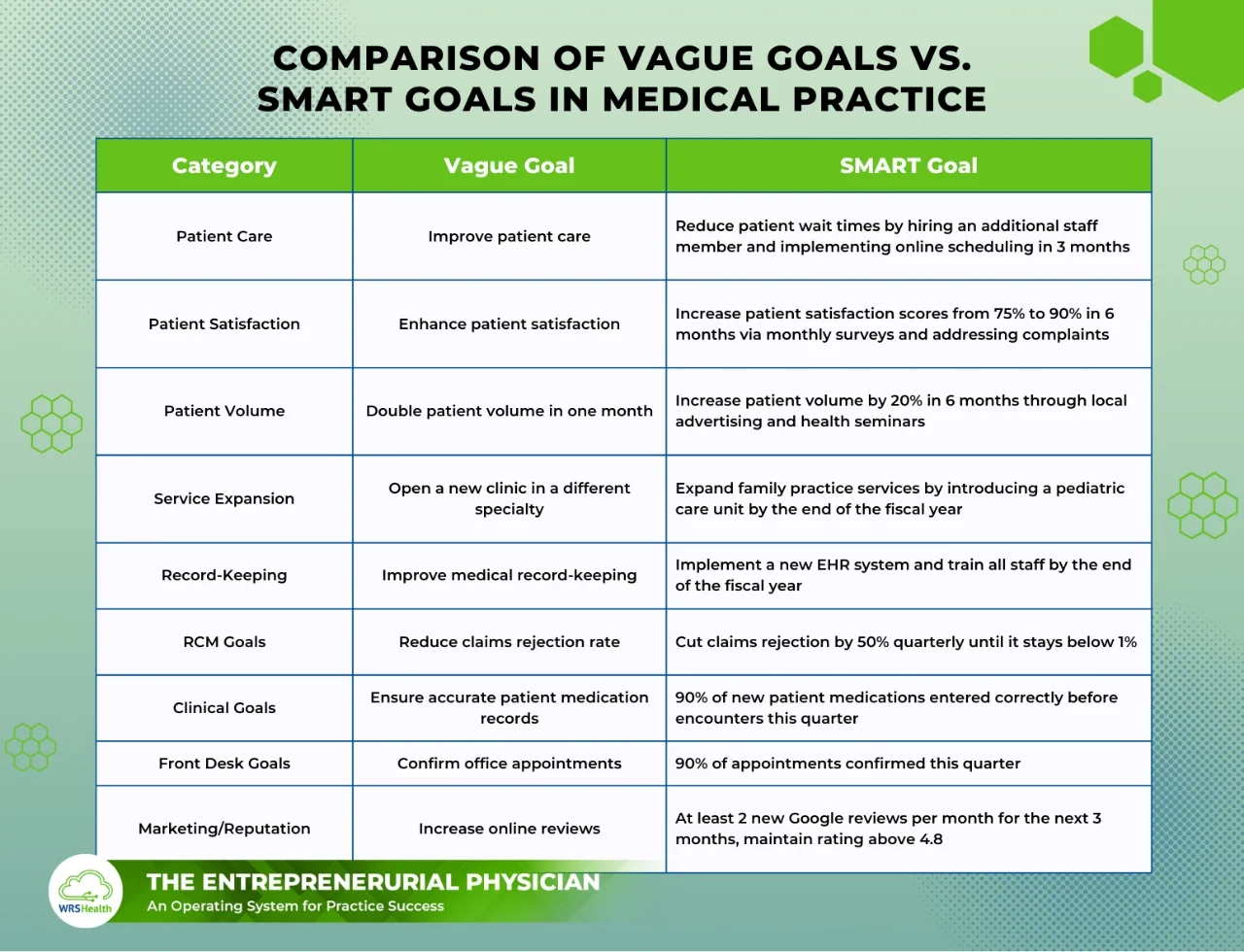As a practice owner with a desire to improve and make our practice better, we all have goals. When we assume the role of entrepreneur, manager, or technician, the quality of these goals may be slightly different. But, make no mistake, goals are essential to improvement, optimization, and growth.
Without goals to create order, entropy takes over.
While we may think we have a goal in our heads, without the articulation and naming of that goal, it is challenging to align others with the attainment of that goal. If achieving a goal is dependent on others (and it usually is), then it is important that everyone’s goals align together. Without alignment, you risk expending energy but never reaching a goal. And in the end, the only outcome is frustration and wasted energy (heat).
When asked if you have specific medical, professional, or life goals, most people would answer in the affirmative. But when challenged with the specific articulation of those goals and the milestones necessary to get there, most fall short and default to a soft description of things done around or toward that goal. This is typical of frustrated people or stagnant businesses that feel sentenced to a ground-hogs-day existence of repeating the same mistake over and over. So, tell me, how do you set a goal?
The SMART goal-setting framework is a popular and effective method for defining and achieving goals in a clear and organized manner. SMART stands for Specific, Measurable, Achievable, Relevant, and Time-bound, and these five criteria help individuals and organizations create well-defined and realistic objectives.
Here’s a breakdown of each component with examples:
- Specific: Goals should be clear and specific, avoiding vague or broad statements. Ask yourself the “who,” “what,” “where,” “when,” and “why” to make your goal specific.
- Vague Goal: “Improve patient care.”
- Specific Goal: “Reduce patient wait times in the clinic by hiring an additional nurse and implementing an online appointment scheduling system within the next three months.”
- Measurable: Goals should include quantifiable criteria to track progress and determine when they have been achieved.
- Non-Measurable Goal: “Enhance patient satisfaction.”
- Measurable Goal: “Increase patient satisfaction scores from 75% to 90% in the next six months by conducting monthly patient feedback surveys and addressing common complaints.”
- Achievable: Goals should be realistic and attainable. While it’s important to set ambitious objectives, they should still be within reach given your resources, time, and abilities.
- Unachievable Goal: “Double the clinic’s patient volume in one month without any marketing budget.”
- Achievable Goal: “Increase the clinic’s patient volume by 20% over the next six months through targeted local advertising and community health seminars.”
- Relevant: Goals should align with your values, long-term objectives, and the overall mission. Ensure that the goal is meaningful and contributes to your personal or organizational growth.
- Irrelevant Goal: “Open a new clinic in a different specialty when my focus is on expanding my current family practice.”
- Relevant Goal: “Expand the range of services offered in the family practice, such as introducing a pediatric care unit, to better serve our patient community and enhance practice growth.”
- Time-bound: Goals should have a defined timeframe or deadline. This adds urgency and helps you stay focused on achieving the goal within a specific period.
- Goal Without a Timeframe: “Improve medical record-keeping.”
- Time-bound Goal: “Implement a new electronic health record (EHR) system and train all staff to use it effectively by the end of the fiscal year.”
By using the SMART framework, individuals and organizations can create goals that are well-defined, measurable, achievable, relevant, and time-bound, increasing the likelihood of successful goal attainment.

Here are more examples of relevant practice goals:
- RCM Goals:
- Reduce the number of claims rejected by 50% each quarter until the claim rejection rate remains below 1%
- Eligibility is confirmed for no fewer than 95% of new patients, whether electronically or manually, reviewed on a monthly basis for the next six months.
- The percentage of aged claims over 90 days is reduced by 50% by removing the top 2 systematic reasons for claim denial/lack of payment this quarter.
- Clinical Goals:
- No less than 90% of new patient medications are correctly entered and reconciled before the physician begins the encounter during this quarter.
- No less than 90% of established patient visits will have lab results available for the physician before the office encounter starts during this quarter.
- We attain our MIPS quality goals for maximal reimbursement by September this year.
- Front Desk Goals:
- 90% of office appointments are confirmed electronically or manually this quarter.
- The percentage of appointments that are missed or “no-shows” is reduced by 50% this quarter.
- 100% of patient payments are collected at the time of visit every month for the next six months.
- Marketing/Reputation Goals:
- No fewer than 2 new Google reviews for the practice per month for the next 3 months.
- Maintain Google review rating this quarter above 4.8.
These goals may sound ambitious or lofty, but they are very achievable. What’s missing from them is the specific and individual behavior, action(s), and responsibilities of the persons who will be held accountable for achieving these goals or the milestones leading to these goals.
Roles, responsibilities, and accountability through performance and goal review will be a subject for another day.
Boost Your Practice’s Financial Health with Our Expert KPI Guide.

Dr. Lawrence Gordon, MD
He is a practicing Otolaryngologist and the founder of ENT Specialty Care located in Goshen, NY. He is also the CEO and Founder of WRS Health. The software is an all-in-one platform, designed by physicians, providing clinician-centered workflow solutions to continually improve and grow your practice.





 QUICK CHARTING
QUICK CHARTING NOTE
NOTE MEDICATION
MEDICATION PATIENT
PATIENT BILLING
BILLING RISK
RISK MARKETING
MARKETING MIPS
MIPS